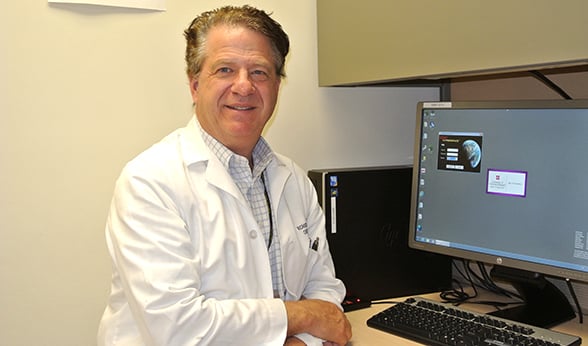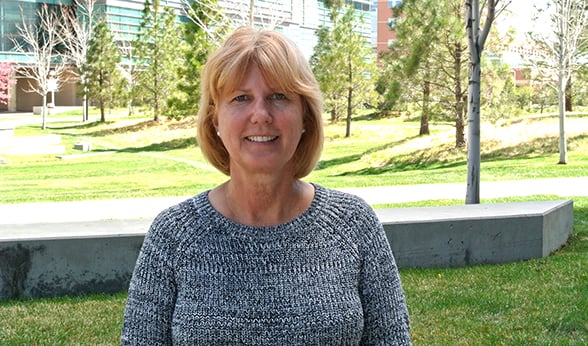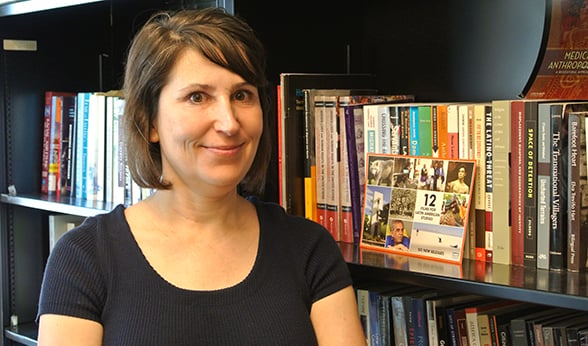A group of University of Colorado scientists are taking a leadership role to investigate the effects of climate change on health, which has emerged as a dominant issue of this century and beyond.
They are launching education, research and community partnerships with a clear aim: safeguard human health.
 Richard Johnson, MD, Medicine-Renal Medicine Diseases, SOM, is a founding member of UC4Health.
Richard Johnson, MD, Medicine-Renal Medicine Diseases, SOM, is a founding member of UC4Health.
UC4Health (University of Colorado Consortium on Climate Change and Health) has already brought together more than 20 faculty members at CU Anschutz, CU Denver and CU-Boulder to study the broad effects of climate change, including waterborne, foodborne and vector-borne diseases.
Only a handful of academic institutions have responded to the issue, said Richard Johnson, MD, professor, Medicine-Renal Medicine Diseases, School of Medicine (SOM) and a founding member of UC4Health. He said CU’s deep and diverse spectrum of health experts and scientists – physicians, climatologists, anthropologists, immunologists, epidemiologists, pediatricians, geneticists, physiologists and more – sets the institution up to be a strong leader in the field.
‘Banding together’
“Climate change and health is a neglected field despite the fact that the climate is actively changing on us,” says Johnson, pointing to recent data that shows January and February were the planet’s warmest months on record. “Here at CU, we have a grassroots movement in that physicians and scientists are banding together to address the problem.”
The group applied for a School of Medicine Transformational Research Funding grant last fall, proposing a Clinical Center for Climate and Health. While the grant was not selected for final inclusion, it created the environment for faculty from disparate research areas to come together to tackle problems around climate change and health. By operating as a consortium, members say, the group can take a broader approach to its trifold mission of research, education and partnerships.
 Rosemary Rochford, PhD, professor of Immunology-Microbiology, SOM, and Environmental/Occupational Health, Colorado School of Public Health, is the leader of UC4Health.
Rosemary Rochford, PhD, professor of Immunology-Microbiology, SOM, and Environmental/Occupational Health, Colorado School of Public Health, is the leader of UC4Health.
UC4Health leader Rosemary Rochford, PhD, professor of Immunology-Microbiology, SOM, and Environmental/Occupational Health, Colorado School of Public Health (ColoradoSPH), emphasizes that the group is not looking into the causes of climate change, but rather the health effects from it.
A key question, is ‘How do research and academic institutions develop the next generation of scientists to deal with this problem?’ “The educational piece is huge, and it has to be interdisciplinary by its nature,” Rochford says. “Instead of reacting to what’s already been studied, I think we should be leading the field.”
‘A fantastic step’
David Goff, MD, PhD, dean of the ColoradoSPH, says planetary health was a major topic of discussion at a recent Association of Schools and Programs of Public Health conference. “The concept is similar to what our folks are working on in the consortium,” he says. “It’s the idea of safeguarding both human health and the natural systems that underpin it.”
[perfectpullquote align="right" cite="" link="" color="" class="" size=""]Membership in the consortium is open, and the group anticipates that as the UC4Health gains recognition, it will bring more faculty into this important research arena. For more information, contact Rosemary Rochford at Rosemary.Rochford@ucdenver.edu[/perfectpullquote]
While the past century has seen tremendous improvements in human health, Goff says, other activities have put stress on the planet by degrading the soil, oceans and atmosphere. The question for this century and beyond, he says, is ‘How do we sustain our current status and improve human health while at the same time not degrading the planet?’
Goff is among the CU Anschutz leadership team that supports the consortium, saying UC4Health demonstrates yet another way CU innovates and collaborates with partner universities for the greater good – in this case, a more comprehensive approach to planetary health. “This is a fantastic step to focus on the importance of climate in human health and ecosystem health, in terms of the plants and animals we share the environment with,” he says.
A few examples of UC4Health progress so far:
- Education: Rochford; Elizabeth Carlton, PhD, MPH, assistant professor, Environmental and Occupational Health, ColoradoSPH; and Jay Lemery, MD, associate professor, Emergency Medicine, SOM; received approval for a “Climate and Health” course to be offered this fall in the ColoradoSPH at CU Anschutz. Lemery and Christopher Davis, MD, assistant professor of emergency medicine, SOM, will teach “Introduction to Polar Medicine” in Greenland – “Nobody’s done anything else like this,” Lemery says – over a week in August.
- Research: Three main research themes are envisioned: metabolic diseases, disaster medicine, and infectious diseases. The consortium plans to host at least two international/national leaders in climate and health next academic year.
- Community partnerships: In the Transformational Research application, the group received letters of support from a diverse array of leadership from government agencies as well as local community partners. The Aspen Global Change Institute invited UC4Health to conduct a conference this September.
Consortium research will focus on understanding the effects of climate change on human health and then develop tools, policies and the necessary workforce to monitor, adapt and mitigate those effects.
 Sarah Horton, PhD, associate professor of Anthropology, is a CU Denver member of the consortium.
Sarah Horton, PhD, associate professor of Anthropology, is a CU Denver member of the consortium.
Consortium member Sarah Horton, PhD, associate professor of Anthropology at CU Denver, says environmental topics “will only increase in importance” this century, such as how climate change is transforming the landscape of diseases. She investigates the growing occupational risks faced by outdoor workers amid unpredictable and rising summer temperatures. For example, there have been 13 confirmed deaths among farmworkers between 2005 and 2014 in California alone due to working in the heat.
‘A matter of environmental justice’
Heat illness also interacts synergistically with chronic disease such as hypertension, diabetes and cardiovascular disease, Horton says. New investigations – including research conducted by Johnson and others in the consortium – suggests that chronic heat exposure may play a role in kidney failure, helping to explain the epidemic of chronic kidney disease of unknown origin affecting agricultural workers in Central America.
Such research can lead to workplace interventions and public policy, according to Horton. “The consortium can play an important role in helping mitigate the effects of heat stress faced by vulnerable populations,” she says. “This is a matter of not only pressing research but also environmental justice.”
Opportunities for collaboration
Rochford says there are ample opportunities in Colorado for investigator collaborations – not just among the campuses, but also with the National Center for Atmospheric Research (NCAR) and the National Oceanic and Atmospheric Administration (NOAA). Representatives at the Centers for Disease Control have also expressed support for the consortium.
“At the end of the day, we have to not only identify the diseases that are being affected by climate change, but also how to help people,” Rochford says. “This consortium illustrates a link between those diseases and the way people can be helped, and the ways their health can be improved.”
UC4Health will also investigate local environmental implications of climate change, such as how high-performing Colorado athletes are affected by climbing temperatures.
“Addressing this health problem requires a multidisciplinary team,” Johnson said. “What’s exciting is that the University of Colorado has expertise in these fields and is developing leaders and innovative programs to move the field forward.”
